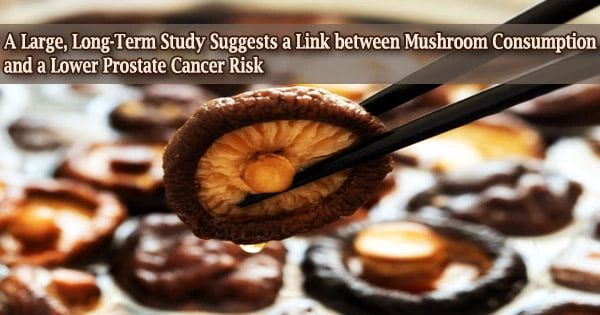The findings of the first long-term cohort research of over 36,000 Japanese men across decades reveal a link between mushroom consumption and a reduced risk of prostate cancer.
Their findings were published in the International Journal of Cancer on September 5, 2019.
When cells in the body begin to grow out of control, cancer develops. Cancer cells can develop in practically any part of the body and spread to other parts of the body. When cells in the prostate gland begin to grow out of control, prostate cancer develops. The prostate gland is only found in men.
Prostate cancer develops when cells in the prostate gland, a small walnut-shaped gland found solely in men that produces the fluid that makes up part of the sperm, grow out of control. With over 1.2 million new cases identified worldwide in 2018, it is one of the most frequent cancers in males, with the risk increasing with age.
Mushrooms are frequently used throughout Asia for their nutritional and therapeutic benefits.
“Test-tube studies and studies conducted on living organisms have shown that mushrooms have the potential to prevent prostate cancer,” said Shu Zhang, an assistant professor of epidemiology in the Department of Health Informatics and Public Health at Tohoku University School of Public Health, Graduate School of Medicine in Japan, and lead author of the study.
“However, the relationship between mushroom consumption and incident prostate cancer in humans has never been investigated before.”
“To the best of our knowledge, this is the first cohort study indicating the prostate cancer-preventive potential of mushrooms at a population level,” said Zhang.
“Although our study suggests regular consumption of mushrooms may reduce the risk of prostate cancer, we also want to emphasize that eating a healthy and balanced diet is much more important than filling your shopping basket with mushrooms.” said Zhang.
However, the relationship between mushroom consumption and incident prostate cancer in humans has never been investigated before. To the best of our knowledge, this is the first cohort study indicating the prostate cancer-preventive potential of mushrooms at a population level.
Shu Zhang
The researchers followed two cohorts of 36,499 men between the ages of 40 and 79 years in Miyagi and Ohsaki, Japan, from 1990 to 1994.
The Miyagi cohort was followed for 24.5 years, from June 1, 1990 to December 31, 2014, while the Ohsaki cohort was followed for 15 years, from January 1, 1995 to March 31, 2008. (13.25 years).
The males were asked to fill out a questionnaire on their lifestyle choices, including mushroom and other food consumption, physical activity, smoking, and drinking habits, as well as information about their education, family, and medical histories.
Males who ate mushrooms on a daily basis had a lower risk of prostate cancer, according to long-term follow-up. This was notably true in individuals aged 50 and older, and in men whose diet consisted primarily of meat and dairy products, with little fruit and vegetable consumption.
Regular mushroom eating was linked to a lower risk of prostate cancer, regardless of how much fruit and vegetables, meat, or dairy products were consumed, according to statistical analysis of the data (using the Cox proportional hazards model).
During the follow-up period, 3.3 percent of the individuals got prostate cancer. Participants who ate mushrooms once or twice a week had an 8% reduced risk of prostate cancer than those who ate mushrooms less than once a week, while those who ate mushrooms three or more times a week had a 17 percent lower risk.
“Mushrooms are a good source of vitamins, minerals, and antioxidants, especially L-ergothioneine,” according to Zhang, which is thought to protect against oxidative stress, a cellular imbalance caused by poor diet and lifestyle choices, as well as exposure to environmental toxins, which can lead to chronic inflammation, which is linked to chronic diseases like cancer.
“The results of our study suggest mushrooms may have a positive health effect on humans,” said Zhang.
“Based on these findings, further studies that provide more information on dietary intake of mushrooms in other populations and settings are required to confirm this relationship.”
“Considering the average American consumes less than 5 grams of mushrooms per day, which is lower than that consumed by the participants in this study (7.6 g/day) one would expect that even a small increase in mushroom consumption to offer potential health benefits,” said Zhang.
















